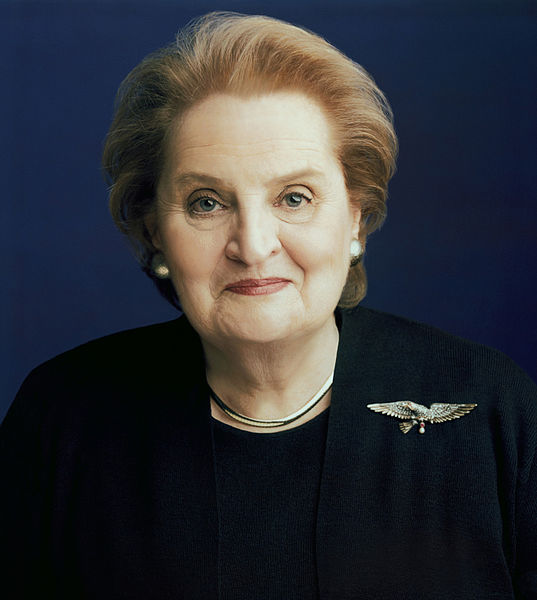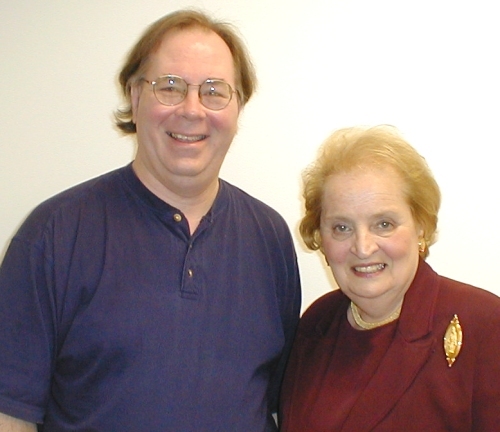She was a pioneer, the first woman to do what she did.
It was on this day some 22 years ago that Madeleine Albright took over as America’s Secretary of State under President Bill Clinton.
And she admitted, when I met her a few years later, that there were good days and bad, and some surprises.
On January 23, 1997 Madeleine Albright became America’s first female Secretary of State.
In 2003 she wrote a memoir called, “Madame Secretary,” and that’s when I met her.
“I really did do something, a ‘first’ in the women’s world, to become the first woman Secretary of State. And yet my career path was a little confused, a little zig-zaggy, quite characteristic of what is true of women my age. But I wanted to show that it was possible to get from here to there.
“And added to that, I was an immigrant. I came to this country when I was eleven years old. So it’s a good story in terms of the possibilities of this country.”
“At least, I was!”
Madeleine Albright told me that, without getting into any gender stereotypes, she believes women may be better attuned than men are to the subtleties of diplomatic relationships.
BT: Well, you seem to be a very careful observer….

“Well, I enjoyed .. I loved my job. I really did, every part of it, and I gave it everything I had. I enjoyed meeting various people that I did. I speak a number of languages, so I was able to use that, because I think that also opens people up.”
BT: Now, did I read somewhere that you said that in terms of your gender relationships, that sometimes men in other countries treated you with greater respect than men within your own administration.
“Right. There was a question, frankly: could a woman be Secretary of State .. especially in dealing with men in Arab countries? That was the ‘Can she do it?’ aspect of it. And what I found was that I had no problems abroad, mostly because I arrived in a very large plane that said United States of America. And if they wanted to talk to the U.S., I was the only way to do it at that time.
“And, I have to say, the men in our own government — most of whom are very nice people that I’ve known for years — I think couldn’t get over the fact that here they had known me for twenty years, and I’d been a staffer for Ed Muskie or for [Zbigniew] Brzezinski, or their wife’s friend or carpool mother or whatever, and all of a sudden here I had the number one job. So there was a little condescension and a few fireworks.”
BT: Well, you snuck in under the radar, and in Washington you just don’t do that.
“Well, I said I had a ‘stealth career.’ And as Senator [Barbara] Mikulski also said, ‘We were 25-year overnight successes.”
In her book Albright also wrote very frankly about a difficult period in her life, which occurred shortly after she became Secretary of State.
The Washington Post disclosed Albright’s Jewish heritage, reporting that her parents had converted from Judaism to Catholicism when Albright was a little girl.
The paper’s revelation stunned Madeleine Albright, and forced her to reconsider the most fundamental parts of her life.
“I think it’s really divided into two parts. It’s one thing about discovering that I was of Jewish background, which I think just me much more interesting and was a richness added to already a very rich story. And I was very proud to know that I was a part of a people that were so valiant through the years.
“The other part, which really was crushing, was to find out that three of my grandparents had died in the concentration camps. To find it out under the worst circumstances, which is publicly, just at the moment that I was supposed to begin being Secretary of State . when I knew people were watching to see if I could do the job.
“So the combination of finding out something so difficult personally and dealing with it publicly, at a time that was supposed to be the most exciting and best time in my life, was difficult.

“And I also make very clear how deeply hurt I was that people blamed my father. and thought that he was a fraud or a liar. I could deal with criticisms against me, because I was here to defend myself, but I adored my father, so I found that very hard. And it’s something I’m still working my way through.”
BT: Do you feel Jewish?
“Uh, I don’t know, frankly. I feel that I’m a complicated human being. I was raised a Catholic, I became an Episcopalian when I got married. It’s very strange to be 66 years old and not be totally clear about something to basic as your religion.
So how does Madeleine Albright want to be remembered?
“I want to be remembered as somebody who paid back to the American people the generosity of having been allowed to grow up a free American, because it may sound hokey to some people but I really think this is an incredible country and for me, it was the most amazing honor to be able to sit behind a sign that said ‘United States’ and to represent the United States abroad.”